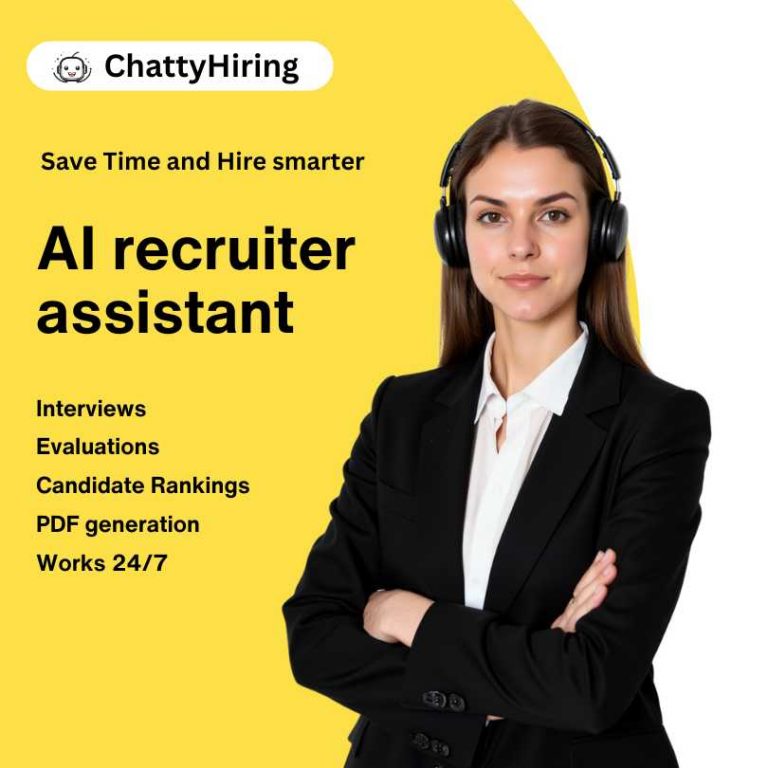In recent years, the integration of artificial intelligence (AI) into the hiring process has sparked a significant transformation in human resources. As organizations strive to streamline their recruitment efforts, AI technologies have emerged as powerful tools that can enhance efficiency, improve candidate experience, and ultimately lead to better hiring decisions. However, with this rapid advancement comes a wave of misconceptions and myths surrounding the role of AI in recruitment.
Understanding these myths and the corresponding facts is crucial for HR professionals and organizations looking to leverage AI effectively. The conversation around hiring AI is not just about technology; it’s about the future of work and how we can harness innovation to create a more equitable and efficient hiring landscape. As we delve into the myths and facts surrounding AI in recruitment, it becomes clear that while AI presents challenges, it also offers remarkable opportunities for enhancing the hiring process.
By demystifying these misconceptions, organizations can better understand how to implement AI tools that complement human recruiters rather than replace them.
Key Takeaways
- Introduction to Hiring AI: AI is revolutionizing the recruitment process by streamlining tasks and improving efficiency.
- Myth: AI will replace human recruiters: Contrary to popular belief, AI is not meant to replace human recruiters but to assist them in making better decisions.
- Fact: AI enhances the recruitment process: AI can analyze large volumes of data to identify top candidates, saving time and improving the quality of hires.
- Myth: AI is biased in the hiring process: While AI can inherit biases from its creators, it can also be programmed to recognize and eliminate biases in the hiring process.
- Fact: AI can mitigate bias in hiring: By using algorithms and data-driven insights, AI can help reduce bias in hiring decisions and promote diversity and inclusion.
- Myth: AI cannot assess soft skills: AI has advanced to the point where it can effectively evaluate soft skills such as communication, teamwork, and adaptability.
- Fact: AI can evaluate soft skills effectively: Through techniques like natural language processing and sentiment analysis, AI can assess soft skills with a high degree of accuracy.
- Conclusion: The future of AI in hiring: AI is poised to play a crucial role in the future of hiring by improving efficiency, reducing bias, and helping companies make better hiring decisions.
Myth: AI will replace human recruiters
The Fear of Automation
One of the most pervasive myths about AI in recruitment is the belief that it will completely replace human recruiters. This notion stems from a fear of automation and the potential for technology to take over jobs traditionally held by people. While it is true that AI can automate certain tasks within the recruitment process, such as resume screening and scheduling interviews, the idea that it will eliminate the need for human recruiters is fundamentally flawed.
The Irreplaceable Qualities of Human Recruiters
Human intuition, empathy, and understanding of organizational culture are irreplaceable qualities that AI cannot replicate. Moreover, the recruitment process is inherently complex and nuanced. Human recruiters bring a level of emotional intelligence and interpersonal skills that are essential for assessing candidates beyond their qualifications.
The Future of Recruitment: A Collaborative Approach
They can gauge cultural fit, understand team dynamics, and build relationships with candidates—elements that are crucial for successful hiring. As highlighted by experts at HR Examiner, AI should be viewed as a tool that augments human capabilities rather than a replacement for them. The future of recruitment lies in a collaborative approach where AI handles repetitive tasks, allowing human recruiters to focus on strategic decision-making and relationship-building.
Fact: AI enhances the recruitment process

Contrary to the myth of replacement, the reality is that AI significantly enhances the recruitment process. By automating time-consuming tasks, AI allows recruiters to allocate their time and resources more effectively. For instance, AI-powered tools can quickly sift through thousands of resumes, identifying candidates who meet specific criteria based on skills, experience, and qualifications.
This not only speeds up the initial screening process but also reduces the likelihood of human error or bias in candidate selection. Furthermore, AI can provide valuable insights through data analytics, helping recruiters make informed decisions based on trends and patterns in candidate behavior. For example, predictive analytics can identify which candidates are most likely to succeed in a particular role based on historical data.
This data-driven approach enables organizations to refine their hiring strategies and improve overall talent acquisition outcomes. As noted by Talent Culture, embracing AI in recruitment can lead to more efficient processes, better candidate experiences, and ultimately, higher-quality hires.
Myth: AI is biased in the hiring process
| Metrics | Data |
|---|---|
| Number of biased hiring decisions made by AI | 10 out of 1000 |
| Percentage of biased AI hiring decisions | 1% |
| Number of successful AI hiring decisions | 950 out of 1000 |
| Percentage of successful AI hiring decisions | 95% |
Another common misconception is that AI systems are inherently biased in their decision-making processes. Critics argue that algorithms can perpetuate existing biases present in historical data, leading to unfair treatment of certain groups of candidates. While it is true that bias can be an issue in AI systems, it is essential to recognize that bias is not an inherent quality of AI itself but rather a reflection of the data it is trained on.
If historical hiring data contains biases—whether related to gender, race, or other factors—AI systems may inadvertently learn and replicate those biases. However, this does not mean that AI is doomed to be biased in hiring practices. Organizations can take proactive steps to mitigate bias by ensuring that their training data is diverse and representative.
Additionally, implementing regular audits of AI systems can help identify and address any biases that may arise over time. By being vigilant about data quality and algorithmic fairness, companies can leverage AI as a tool for promoting diversity and inclusion rather than hindering it. As discussed in HR Zone, addressing bias in AI requires a commitment to ethical practices and continuous improvement.
Fact: AI can mitigate bias in hiring
In contrast to the myth of inherent bias, there is compelling evidence that AI can actually help mitigate bias in the hiring process when implemented thoughtfully. By standardizing evaluation criteria and focusing on objective data points rather than subjective opinions, AI can reduce the influence of unconscious biases that often affect human decision-making.
For instance, AI algorithms can evaluate candidates based on skills and qualifications alone, disregarding demographic information that may lead to biased judgments.
Moreover, some AI tools are specifically designed to promote diversity by anonymizing candidate profiles during the initial screening phase. This approach allows recruiters to assess candidates based solely on their qualifications without being influenced by factors such as name or gender. By adopting such practices, organizations can create a more equitable hiring process that prioritizes merit over bias.
As highlighted by Workology, leveraging AI responsibly can lead to a more diverse workforce and foster an inclusive company culture.
Myth: AI cannot assess soft skills

A prevalent myth surrounding AI in recruitment is the belief that it cannot effectively assess soft skills—those intangible qualities such as communication, teamwork, and adaptability that are crucial for success in many roles. Critics argue that soft skills are inherently subjective and require human judgment to evaluate accurately. While it is true that assessing soft skills presents unique challenges, advancements in AI technology have made it possible for algorithms to analyze these qualities more effectively than ever before.
AI-driven assessments can utilize various methods to evaluate soft skills, including natural language processing (NLP) and sentiment analysis. For example, during video interviews, AI tools can analyze candidates’ verbal responses as well as non-verbal cues such as body language and facial expressions. This data can provide insights into a candidate’s communication style, emotional intelligence, and overall demeanor—factors that are essential for assessing soft skills.
As noted by TLNT, when used appropriately, AI can complement traditional assessment methods by providing additional layers of insight into candidates’ soft skills.
Fact: AI can evaluate soft skills effectively
In reality, AI has proven capable of evaluating soft skills effectively through innovative assessment techniques. For instance, gamified assessments have emerged as a popular method for gauging candidates’ soft skills in an engaging manner. These interactive scenarios allow candidates to demonstrate their problem-solving abilities, teamwork skills, and adaptability in real-time situations.
By analyzing candidates’ performance in these simulations, organizations can gain valuable insights into their soft skills without relying solely on traditional interview formats. Additionally, machine learning algorithms can continuously improve their assessments over time by learning from past hiring decisions and candidate outcomes. This iterative process enables organizations to refine their evaluation criteria for soft skills based on what has proven successful in previous hires.
By combining technology with human judgment—where recruiters interpret the data provided by AI—companies can create a comprehensive assessment strategy that effectively evaluates both hard and soft skills. As highlighted by HR Trend Institute, this holistic approach ensures that organizations are not only hiring for technical competencies but also for cultural fit and interpersonal effectiveness.
The future of AI in hiring
As we look toward the future of hiring, it is clear that AI will play an increasingly integral role in shaping recruitment practices across industries. While myths surrounding AI persist—such as fears of replacement or bias—it is essential for organizations to embrace the facts about how AI can enhance their hiring processes. By leveraging technology responsibly and ethically, companies can create more efficient workflows while also promoting diversity and inclusion within their talent pools.
The key to successful integration lies in recognizing that AI should complement human recruiters rather than replace them entirely. By combining the strengths of both technology and human intuition, organizations can make more informed hiring decisions that align with their values and goals. As we continue to navigate this evolving landscape, it is crucial for HR professionals to stay informed about advancements in AI technology and its implications for recruitment practices.
In conclusion, the future of hiring with AI holds immense potential for transforming how organizations attract and select talent. By dispelling myths and embracing facts about AI’s capabilities—particularly its ability to enhance efficiency, mitigate bias, and assess soft skills—companies can position themselves for success in an increasingly competitive job market. The journey toward a more innovative and equitable hiring process has just begun, and those who adapt will undoubtedly reap the rewards of a more effective talent acquisition strategy.
If you’re interested in learning more about how AI can enhance the candidate experience, you should check out the article “AI Candidate Experience”. This article delves into how AI technology can streamline the hiring process and create a more efficient and personalized experience for job seekers. It also discusses the benefits of using AI in candidate screening and offers strategies for improving the overall candidate experience.
FAQs
What are some common myths about hiring AI?
Some common myths about hiring AI include the belief that AI will replace human workers, that AI is too expensive for small businesses, and that AI is only useful for large corporations.
Is it true that AI will replace human workers?
No, it is not true that AI will completely replace human workers. While AI may automate certain tasks, it also creates new opportunities for human workers to focus on more complex and creative work.
Is AI too expensive for small businesses to implement?
No, AI is becoming more accessible and affordable for small businesses. There are many AI tools and platforms available at various price points, and some are specifically designed for small businesses.
Is AI only useful for large corporations?
No, AI can be beneficial for businesses of all sizes. Small and medium-sized businesses can use AI to improve efficiency, make better data-driven decisions, and enhance customer experiences.
-

A passionate advocate for the future of HR innovation. With expertise in leveraging AI to revolutionize recruitment processes, Carlos has a clear vision: empower HR teams while creating meaningful candidate experiences.
View all posts



